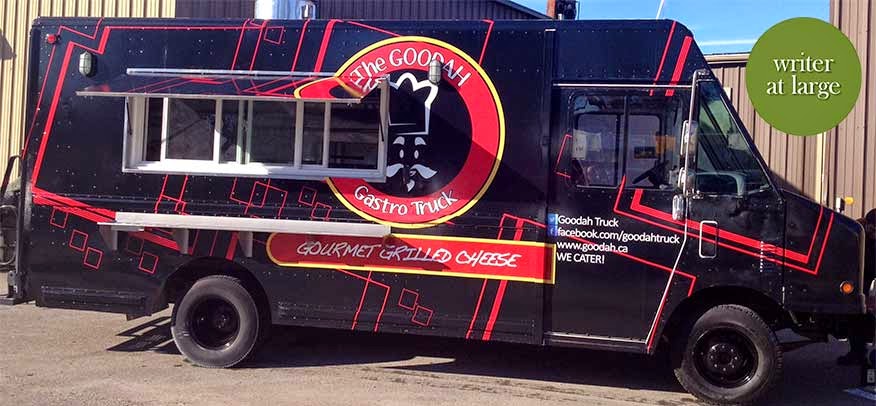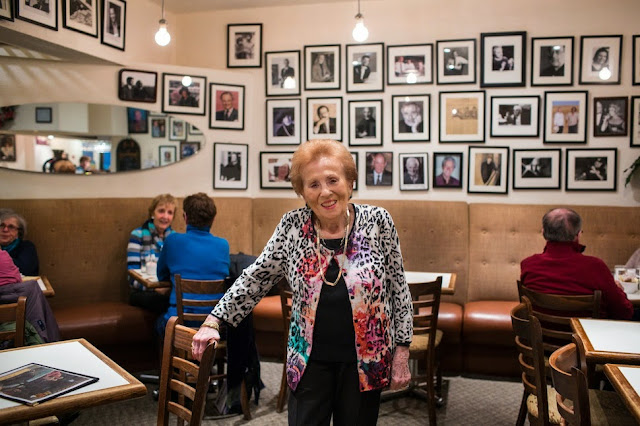London, Ontario Food Truck Update March 2015: The New Incubators For Culinary Innovation
BY BRYAN LAVERY
Modern (gourmet) food trucks serve a diverse variety of healthy options and cultural foods in other cities. They are positioned to incubate new businesses and become an alternative launching pad for healthy, creative food. In fact, food trucks are the new incubators for culinary innovation. I am not talking about corporate food trucks serving commercially produced food. I am speaking about the chef-driven, entrepreneurial, indie food truck operators who tweet their location of the day to those in the know. Locally, think of the Goodah Gastrotruck whose operators are gearing up to grilling up their gourmet grilled cheese sandwiches curbside this summer.
I am a proponent of food trucks because they stimulate culinary
innovation and ethnic culinary diversity, draw tourists, provide employment,
and contribute to the social and culinary fabric of the city.
Well finally after three years of
acrimonious debate, London residents will be able to eat at food trucks on city
streets. During London City Council’s meeting on Feb. 24, London City Council
voted unanimously, 15-0, to approve changes to the city’s Business Licensing
Bylaw to allow a measly eight food trucks on London streets by this summer.
During the previous week’s session, councillors resolved to establish
the licensing fee for each truck at $1,225, dismissing a proposal to require
the installation of GPS units to monitor the trucks’ whereabouts. They also set
a limit of eight licenses for the 2015 pilot, but staff will be able to come
back and ask City Council to increase that amount if demand outweighs the
number of obtainable licences.
Under the terms of the proposal, food trucks are required to
stay 100 m from schools and special events while they’ll have to maintain a 25
m buffer zone around restaurants, homes and apartments. Operators also won’t be
allowed to be stationary for more than 24 hours and are prohibited from
operating between 3 a.m. and 7 a.m. But every North American city with food trucks has
rules. That includes Portland, Los Angeles, Chicago, Vancouver, Calgary and
even food-truck friendly Hamilton.
In London,
food trucks have been a topic of debate for several years now, and previous
councils have voted against them over fears that established restaurateurs will
lose business. In an about face, a written request from Downtown London (Business Improvement .Association) suggested reducing the
number of food trucks involved in the pilot to 2% of the brick-and-mortar
eateries, or four trucks. A
group of 25 (mostly Richmond Row) restaurateurs had previously written a letter to council. http://www.am980.ca/files/2015/01/New-Letter-to-City.pdf
Ward 10 councilor Virginia Ridley recognized
this issue. “We’ve heard from the downtown restaurant owners and there’s a
limited amount of dollars that people spend,” she said. “The concern is now
they’re getting less of it.”
Councillor
Jessie Helmer, empathetic to restaurant owner concerns, stated that setbacks
are essential to safeguard their businesses from the competition of food
trucks, but he is confident that once the pilot is launched and the council can
see how it is going to work everyone’s uncertainties will be put to rest. The previous
council voted against them over concerns that current restaurant owners will
lose business. The argument against food trucks is
that they’re stealing the business of more established bricks-and-mortar
restaurants. I have seen no evidence
suggesting food trucks have undermined anyone’s business, restaurant or
otherwise.
Helmer also enquired about the probability of amending the
bylaw to permit restaurants to opt out of the buffer zone if they wanted. The
same idea was first raised by Councillor Michael van Holst last week. Helmer
also questioned if the motion could be amended to allow for food trucks to set
up in front of restaurants that are closed. He noted there are some restaurants
that don’t open on Sundays and it wouldn’t hurt to allow food trucks to service
the community in those locations under those conditions.
Those proposals will eventually be put over until this
fall’s review of the pilot project as Mayor Matt Brown reminded Helmer that any
modifications made to the bylaw now would need to go back to the committee
level and be approved again, extending the already protracted procedure.
Businesses will be able to apply for the eight licences as
of (today) Monday, March 2nd. The pilot will operate
during the summer with plans to appraise its success in the fall. In that
meeting the council is expected to review whether or not the constraints that
have been put in place are needed.




Comments
Post a Comment